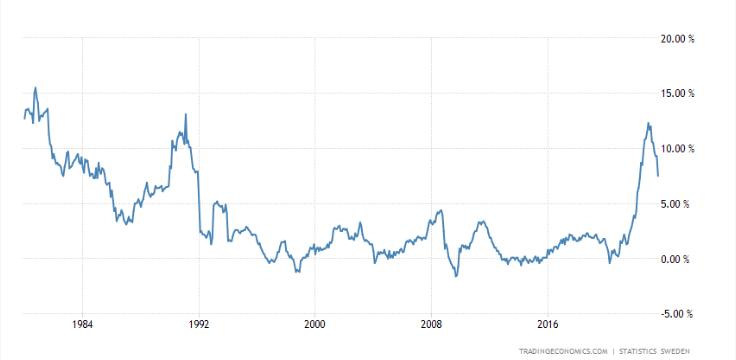
1. Teqnion AB Company Overview
Teqnion was founded in 2006, and it is an industrial group, or “Serial Acquirer,” based in Sweden. The company focuses on acquiring profitable and niche companies with low risk and a sustainable product portfolio, which means that its subsidiaries offer products that are needed today and will remain useful for the foreseeable future. The company currently owns 25 subsidiaries, which are operated and managed in a decentralized way, which allows the previous owners and managers of these acquired businesses to manage their company and have the support of Teqnion to undertake their projects and grow the business as they see fit. As a side note, Teqnion is one of the holdings of Woodlock House Family Capital. This fund is managed by Chris Mayer, a well-known investor and author of the book “100 Baggers”. One of his articles was the source of our initial encounter with Teqnion Stock, and we did find some interesting characteristics of the business that we will cover in this article
Teqnion’s business model is to acquire profitable and stable businesses in niche markets where they have leading competencies, provide financial and managerial support to drive the efficiency, growth, and profitability of these acquired businesses, reinvest the free cash flow generated from the subsidiaries to buy more niche and “unsexy” businesses, and repeat the process over and over. This business model of “serial acquirers” is a proven business model globally and in Sweden, where Teqnion could be competing in the future with similar companies such as Indutrade, Lifco, and Lagercrantz Group, which have successfully implemented Teqnion’s business model.
2. Teqnion Financial Performance
From 2014 to 2022, sales have increased from SEK 115 million to 1,325 million SEK, an impressive 37% CAGR. On the bottom line, net income grew at a 44% CAGR; it went from SEK 5.9 million in 2014 to SEK 110 million in 2022. Teqnion’s profit margin has increased from 3.97% in 2016 to 8.32% in 2022, with an average of 7,46%, which reflects Teqnion’s ability to sustain its margins while executing its business acquisition model.
A key aspect to highlight in Teqnion’s performance is its commitment to profitability, which is embedded in its key goals. The first is to grow their revenue by over 10% per year over a business cycle (it may vary yearly as they focus on the long term). The second goal is to have an EBITDA margin of over 10% per year. Their third goal is to have a return on equity over 20%, and their fourth goal is to not exceed 2x adjusted EBITDA for the last 12 months, ensuring that the company won’t overdose on external debt to finance their acquisitions.
Teqnion’s commitment to only acquiring companies where Teqnion can at least double its earnings per share every five years, or 15% per year over the long term, And they have delivered on this goal; since 2014, its EPS has increased by 18 times, going from $0.37 EPS to $6.84 EPS in 2022. Moreover, Teqnion’s average ROIC since 2017 is 18.98%, which reflects Teqnion’s ability to deploy capital to acquire profitable businesses.
Finally, their balance sheet is quite robust at the time; Teqnion’s current ratio as of Q2 2023 is 1,30, and they have a debt-to-free cash flow ratio of 4, using its 5-year average free cash flow. This stable balance sheet puts the company in a neutral position to withstand the current economic uncertainty, which is accentuated in small businesses.
3. Teqnion Subsidiaries
Teqnion’s acquisition has slowed down due to the economic environment in Sweden, but it has continued despite the uncertain period. In 2021, they acquired five companies; in 2022, they acquired four companies; and as of Q2 2023, they have acquired two companies. Out of the 25 subsidiaries, 22 are based in Sweden, two of them are located in the UK, and one is located in Ireland. This reflects Teqnion’s approach to international expansion and diversification to build a robust and well-diversified business group.
The subsidiaries are categorized into three different segments: industry, growth, and niche. As of 2021, the EBITA provided by these segments accounted for 36%, 11%, and 53% of Teqnion’s total EBITA amount, respectively. Since 2022, most of the companies acquired have been small businesses, which represent a higher EBITA margin (15%) compared to 8,50% in the industry segment and 12% in the growth segment. So, it is interesting to see a higher increase in the businesses acquired under this business segment, as they tend to have stronger competitive advantages due to their very specific and tailored products, which adds to the overall robustness of Teqnion.
4. Teqnion Q2 2023 Analysis
For this quarter, revenue increased by 12% against 2022, EBITA increased by approximately 25%, and EPS increased by 12%. As a whole, Teqnion is experiencing some slowdown due to the increasing interest rates in Sweden and the tough economic situation, which is worsened by the housing sector, to which Teqnion has some exposure through its home building subsidiaries and the others who provide lighting sources, lamps, home furnishings, and construction supplies. For this quarter, there was no organic growth, and the whole 12% increase was due to the acquisitions performed during this period.
In the upcoming quarters, Teqnion’s robustness will be challenged as their industry segment and some of the niche businesses are exposed to sensitive sectors that are being impacted by the increase in interest rates, which are now at 4%. Although inflation has decreased to 7.5% after reaching 12% in December 2022, it remains at all-time highs since 1992, and there is still some pressure to be felt to reach Sweden’s inflation rate goal of 2%.

5. Teqnion Stock Ownership
The commitment of the management and board to Teqnion’s future is visible in its ownership of the company. Johan Steene, who is the CEO and founder of Teqnion, owns approximately 5.5% of the total shares outstanding, as per the latest ownership data provided in the 2022 Annual Report on March 2023, including the recently issued 886,366 shares in July 2023, in order to support the acquisition of potential subsidiaries.Additionally, Erik Surén, who is a board member and a Teqnion founder, owns approximately 4.3% of the shares outstanding. Although Erik has sold approximately 32% of his shares in Teqnion since 2019, he remains well-invested in the company, and Johan has maintained his shares. This investor ownership reflects an interesting alignment and commitment of Teqnion’s founders to the performance and growth of the company in the future.
Teqnion Management
Teqnion’s management has delivered and is even excelling at its target to double its earnings every five years. Their focus on stability, profitability, and shareholder value has allowed them to increase their number of subsidiaries from 13 in 2019 to 25 in 2023. Their mindset towards acquiring companies and allowing them to develop in a decentralized manner is quite similar to Berkshire Hathaway’s approach; they allow the acquired companies’ CEOs and founders to continue to manage their businesses with autonomy while having Teqnion’s financial and operational support to grow the business and its profitability.
Additionally, their long-term view of Teqnion’s development and the scalability of the company on a worldwide basis adds an interesting value to the management commitment of partnering with great people and growing its subsidiaries while having fun, which is something that Teqnion’s CEO mentions quite regularly in his interviews, and that long-term perspective on a business that, as delivered on its financial goals while maintaining a strong ROIC and relatively stable financial position, makes the case for Teqnion’s management being able to compound its value for a long time.
6. Teqnion Stock Valuation
For a company that has grown its sales at a 40% CAGR and its net income at a 58% CAGR since 2016, Teqnion’s stock current P/E valuation of 28.1 doesn’t look out of line with its value generation capacity, its management commitment, and its track record of doubling the EPS every 5 years, which is still the goal of the company and the metric by which they determine which businesses to acquire. We think Teqnion is well suited for the long term, and it could be an attractive investment opportunity. However, given the current uncertainty in the Swedish and global economies, it is a great opportunity to watch how businesses perform in times of tighter economic conditions since it certainly influenced Teqnion’s previous performance as they had to pay less interest on their borrowed money to finance part of its acquisitions.
Therefore, we will be closing by looking at the upcoming quarter results to get a feel for the pricing power and stability of its subsidiaries, and ultimately to look for attractive entry points in what we consider a well runned company, with a clear track of growth, profitability, and return over invested capital, which combined with the high skin on the game by its founders and its potential market in the horizont to compound its earnings, Teqnion is valued at an attractive price if you’re looking for a long-term investment, given the fact that over long periods, the multiple (P/E) you pay for a company with high ROIC, doesn’t matter as much as the return over the investment capital they can obtain, which tends to be alligned with the value you will get from investing on the company.
7. Key Metrics to Watch Out
Financial Stability: Given the increasing inflation pressure on Sweden, Europe, and pretty much globally, Teqnion’s ability to handle these turmoils is going to be a key factor in how stable its industry, growth, and niche subsidiaries are, which is likely to be a challenging situation for the company in the short term due to the exposure of its small businesses to Sweden. However, Teqnion currently has a current ratio of 1.34 and a debt-to-free cash flow of 3.99, which adds strength to the overall stability of the company, and a long-term focus is the right way to look at this company and its ability to compound its capital invested.
International Acquisitions: Teqnion’s management has expressed its approach toward diversifying and strengthening the company by acquiring foreign companies, and they have already shown alignment with this approach as they have already acquired three businesses located in the UK and Ireland. So, this geographical extension will be a key and interesting growth driver to monitor to see Teqnion’s ability to replicate its business acquisitions in a profitable and value-oriented manner, which will mitigate the one-country risks that it currently faces with 93% of its sales coming from their Sweden-based subsidiaries.
Operating Cash Flow: Although Teqnion’s sales and net income increased approximately by 12% in the 2nd quarter of 2023, its cash from operating activities decreased by 212% for the quarter, with a reported loss of SEK 20.10 million. So, even though Teqnion has delivered on the conversion of its sales to free cash flow, the operating cash flow will be a key metric to monitor closely as its subsidiaries may face a challenging situation to get payment from their customers given the impact of rising inflation and interest rates.
Disclaimer
The information in this article and on our website does not constitute financial advice, investment advice, trading advice, or an offer to buy or sell any currency, product, or financial instrument. All information found here is purely for informational and educational purposes. You should not treat any opinion expressed by Unlazy Investing as a specific inducement to make a particular investment or to follow a particular strategy, but only as an expression of opinion.



